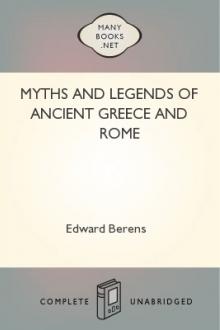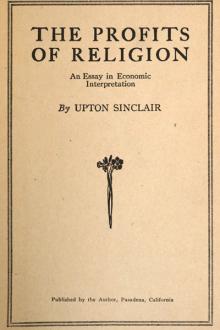Illusions by James Sully (story reading txt) 📕

- Author: James Sully
- Performer: -
Book online «Illusions by James Sully (story reading txt) 📕». Author James Sully
Transition to Philosophic View.
All science makes certain assumptions which it never examines. Thus, the physicist assumes that when we experience a sensation we are acted on by some pre-existing external object which is the cause, or at least one condition, of the sensation. While resolving the secondary qualities of light, sound, etc., into modes of motion, while representing the object very differently from the unscientific mind, he agrees with this in holding to the reality of something external, regarding this as antecedent to and therefore as independent of the particular mind which receives the sense-impression. Again, he assumes the uniformity of nature, the universality of the causal relation, and so on.
Similarly, the modern psychologist, when confining himself within the limits of positive science, and treating mind phenomenally or empirically, or, in other words, tracing the order of mental states in time and assigning their conditions, takes for granted much the same as physical science does. Thus, as our foregoing analysis of perception shows, he assumes that there is an external cause of our sensations, that there are material bodies in space, which act on our sense-organs and so serve as the condition of our sense-impressions. More than this, he regards, in the way that has been illustrated in this work, the percept itself, in so far as it is a process in time, as the normal result of the action of such external agents on our nerve-structures, in other words, as the effect of such action in the case of the healthy and perfect nervous organism with the average organized dispositions, physical and psychical; in which case he supposes the percept to correspond, in certain respects at least, with the external cause as made known by physical science. And, on the other hand, he looks on a false or illusory percept as arising in another way not involving, as its condition, the pre-existence of a corresponding material body or physical agent. And in this view of perception, as of other mental phenomena, the psychologist clearly takes for granted the principle that all mental events conform to the law of causation. Further, he assumes that the individual mind is somehow, in a way which it is not his province to inquire into, one and the same throughout, and so on.
The doctrine of evolution, too, in so far as scientific—that is, aiming at giving an account of the historical and pre-historical developments of the collective mind in time—agrees with psychology in making like assumptions. Thus, it conceives an external agency (the environment) as the cause of our common sensations and perceptions. That is to say, it represents the external world as somehow antecedent to, and so apparently independent of, the perceptions which are adjusted to it. And all this shows that science, while removed from vulgar unenlightened opinion, takes sides with popular thought in assuming the truth of certain fundamental ideas or so-called intuitive beliefs, into the exact meaning of which it does not inquire.
When the meaning of these assumptions is investigated, we pass out of the scientific into the philosophic domain. Philosophy has to critically investigate the data of popular thought and of science. It has to discover exactly what is implied in these fundamental principles. Then it has to test their value by erecting a final criterion of truth, by probing the structure of cognition to the bottom, and determining the proper organ of certain or accurate knowledge; or, to put it another way, it has to examine what is meant by reality, whether there is anything real independently of the mind, and if so, what. In doing this it inquires not only what common sense means by its object-world clothed in its variegated garment of secondary qualities, its beauty, and so on, but also what physical science means by its cosmic mechanism of sensible and extra-sensible matter in motion: whether there is any kind of objective reality belonging to the latter which does not also belong to the former; and how the two worlds are related one to another. That is to say, he asks whether the bodies in space assumed to exist by the physicist as the antecedent conditions of particular sensations and percepts are independent of mind and perception generally.[152]
In doing all this, philosophy is theoretically free to upset as much of popular belief of the persistent kind as it likes. Nor can science find fault with it so long as it keeps to its own sphere, and does not directly contradict any truth which science, by the methods proper to it, is able to establish. Thus, for example, if philosophy finds that there is nothing real independently of mind, science will be satisfied so long as it finds a meaning for its assumed entities, such as space, external things, and physical causes.[153]
The student of philosophy need not be told that these imposing-looking problems respecting cognition, making, up what the Germans call the "Theory of Cognition," and the cognate problem respecting the nature of reality, are still a long way from being settled. To-day, as in the days of Plato and Aristotle, are argued, in slightly altered forms, the vexed questions, What is true cognition? Is it a mere efflux from sensation, a passive conformity of representation to sensation (sensualism or empiricism)? or is it, on the other hand, a construction of active thought, involving certain necessary forms of intelligence (rationalism or intuitivism)?
Again, how are we to shape to ourselves real objective existence? Is it something wholly independent of the mind (realism)? and if so, is this known to be what we—meaning here common people and men of science alike—represent it as being (natural realism), or something different (transfigured realism)? Or is it, on the contrary, something involving mind (idealism)? and if so, is it a strictly phenomenal distinction within our conscious experience (empirical idealism, phenomenalism), or one of the two poles of subject and object constituted by every act of thought (rational idealism)? These are some of the questions in philosophy which still await their final answer.
Philosophy being thus still a question and not a solution, we need not here trouble ourselves about its problems further than to remark on their close connection with our special subject, the study of illusion.
Our brief reference to some of the principal inquiries of philosophy shows that it tends to throw doubt on things which the unreflecting popular mind holds to be indubitable. Different schools of philosophy have shown themselves unequally concerned about these so-called intuitive certainties. In general it may be said that philosophy, though, as I have remarked, theoretically free to set up its own standard of certainty, has in practice endeavoured to give a meaning to, and to find a justification for the assumptions or first principles of science. On the other hand, it has not hesitated, when occasion required, to make very light of the intuitive beliefs of the popular mind as interpreted by itself. Thus, rationalists of the Platonic type have not shrunk from pronouncing individual impressions and objects illusory, an assertion which certainly seems to be opposed to the assumptions of common sense, if not to those of science. On the other hand, the modern empirical or association school is quite ready to declare that the vulgar belief in an external world, so far as it represents this as independent of mind,[154] is an illusion; that the so-called necessary beliefs respecting identity, uniformity, causation, etc., are not, strictly speaking, necessary; and so on. And in these ways it certainly seems to come into conflict with popular convictions, or intuitive certainties, as they present themselves to the unreflecting intelligence.
Philosophy seems, then, to be a continuation of that process of detecting illusion with which science in part concerns itself. Indeed, it is evident that our special study has a very close connection with the philosophic inquiry. What philosophy wants is something intuitively certain as its starting-point, some point d'appui for its construction. The errors incident to the process of reasoning do not greatly trouble it, since these can, in general, be guarded against by the rules of logic. But error in the midst of what, on the face of it, looks like intuitive knowledge naturally raises the question, Is there any kind of absolutely certain cognition, any organ for the accurate perception of truth? And this intimate relation between the scientific and the philosophic consideration of illusion is abundantly illustrated in the history of philosophy. The errors of sense, appearing in a region which to the vulgar seems so indubitable, have again and again set men thinking on the question, "What is the whole range of illusion? Is perception, as popularly understood, after all, a big hallucination? Is our life a dream?"[155]
On the other hand, if our study of the wide range of illusion is fitted to induce that temper of mind which is said to be the beginning of philosophy, that attitude of universal doubt expressed by Descartes in his famous maxim, De omnibus dubitandum, a consideration of the process of correction is fitted to lead the mind on to the determination of the conditions of accurate knowledge. It is evident, indeed, that the very conception of an illusion implies a criterion of certainty: to call a thing illusory, is to judge it by reference to some accepted standard of truth.
The mental processes involved in detecting, resisting, and overcoming illusion, are a very interesting subject for the psychologist, though we have not space here to investigate them fully. Turning to presentative, and more particularly sense-illusions, we find that the detection of an illusion takes place now by an appeal from one sense to another, for example, from sight to touch, by way of verification;[156] now (as in Myer's experiment) by a reference from sense and presentation altogether to representation or remembered experience and a process of reasoning; and now, (as in the illusions of art) conversely, by a transition of mind from what is suggested to the actual sense-impression of the moment. In the sphere of memory, again, illusion is determined, as such, now by attending more carefully to the contents of memory, now by a process of reasoning from some presentative cognition. Finally, errors in our comprehensive general representations of things are known to be such partly by reasoning from other conceptions, and partly by a continual process of reduction of representation to presentation, the general to the particular. I may add that the correction of illusion by an act of reflection and reasoning, which brings the part into consistent relation with the whole of experience, includes throughout the comparison of the individual with the collective or social experience.[157]
We may, perhaps, roughly summarize these operations by saying that they consist in the control of the lower automatic processes (association or suggestion) by the higher activities of conscious will. This activity of will takes the form now of an effort of attention to what is directly present to the mind (sense-impression, internal feeling, mnemonic image, etc.), now of conscious reflection, judgment, and reasoning, by which the error is brought into relation to our experience as a whole, individual and collective.
It is for the philosopher to investigate the inmost nature of these operations as they exhibit themselves in our every-day individual experience, and in the large intellectual movements of history. In no better way can





Comments (0)